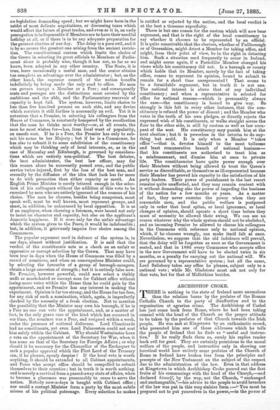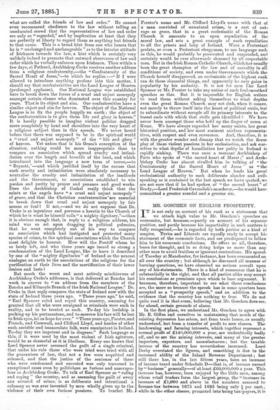ARCHBISHOP CROKE. ARCHBISHOP CROKE. T HERE is nothing in the state
of Ireland more anomalous than the relation borne by the prelates of the Roman Catholic Church to the party of disaffection and to the organisation ot agrarian crime. The Archbishop of Cashel has just come back from Rome, where he had been taking counsel with the head of the Church on the proper attitude to be taken by the prelates of that Church towards the Irish people. He was met at Kingstown by an enthusiastic crowd, who presented him one of those addresses which he tells the people of Ireland that he finds so "useful and instructive." If he really finds them so, surely his replies render back evil for good. They are certainly pernicious to the moral welfare of the people, and instrnctive only in showing our heretical world how entirely some prelates of the Church of Rome in Ireland have broken free from the principles and precepts of the New Testament on the subject of the respect due to the administration of the law. Even in that address at Kingstown in which Archbishop Croke poured out the first fruits of his communings with the head of the Church,—and declared himself, by the way, not the Church, "unchanged and unchangeable,"—his advice to the people to avoid breaches of the law was put in this very sinister form :—" You must be prepared not to put yourselves in the power,—in the power of what are called the friends of law and order." He cannot even recommend obedience to the law without telling an uneducated crowd that the representatives of law and order are only so "regarded," and by implication at least that they are perfectly at liberty to regard them as anything but friends to that cause. This is a broad hint from one who boasts that he is "unchanged and unchangeable "as to the interior attitude of Irishmen towards the law, a hint which is certainly very unlikely indeed to promote that outward observance of law and order which he verbally enforces upon Irishmen. Then within a few days, at Fethard, Archbishop Croke receives another address from a religious confraternity,—the "Confraternity of the Sacred Heart of Jesus,"—to which he replies If I were allowed to introduce anything profane into this matter, I should say that confraternities are the Land League of Heaven (prolonged applause). Our National League was established here to break down the forces of a cruel and unjust monopoly amongst certain classes who dominated over this country for years. That is its object and aim. Our confraternities have a similar object and aim for heaven. The object of the National League is to fix the people happily on earth ; the object of the confraternities is to give them life and glory in heaven." It is hardly possible to imagine violent politics dragged more completely by head and shoulders into the very heart of a religious subject than in this speech. We never heard before that there was supposed to be in the spiritual world a "cruel and unjust monopoly" of the "life and glory" of heaven. Yet unless that is his Grace's conception of the situation, nothing could be more inappropriate than to compare an association which spread cruelty and intimidation over the length and breadth of the land, and which introduced into the language a new term of terror,—to 6r Boycott,"—and which justified itself by the excuse that such cruelty and intimidation were absolutely necessary to neutralise the cruelty and intimidation of the landlords and the Government, to associations established to win pardon and purity by prayer and penance and good works. Does the Archbishop of Cashel really think 'that the saints or the angels have "a cruel and unjust monopoly" of grace, and that the Christian confraternities'are essential to break down that cruel and unjust monopoly by fair means or foul? If not,—and we do not suppose that Dr. Croke is so ingenious and perverse a heretic to the Church of which he is what he himself calls " a mighty dignitary,"—then it is obvious enough that, in reply to a religious address, his mind was so set upon dragging in political polemics, that he went completely out of his way to compare an association which had instigated and protected many species of crime, to the spiritual associations which the Church most delights to honour. How will the Pontiff whom he so lately left, and who three years ago issued so strong a condemnation of the Land League, like to have it described by one of the "mighty dignitaries" of Ireland as the nearest analogue on earth to the associations of the religions for the purification of their lives and the mortification of their lower desires and lusts ?
But much the worst and most actively mischievous of Archbishop Oroke's addresses, is that delivered at Bansha last week in answer to "an address from the members of the Ban sha and Kilmoyle Branch of the Irish National League." Dr. Croke in that reply compares the state of Ireland now with the state of Ireland three years ago. "Three years ago," he said, "Earl Spencer ruled and roped this country, assuming for granted that all who were arraigned as criminals were such in reality, and to be treated as such. To-day his lordship is packing up his portmanteau, and to-morrow his face will be lost to Irish eyes, let us hope for ever." "Three years ago, Forster, and French, and Cornwall, and Clifford Lloyd, and hordes of other such amiable and immaculate folk, were omnipotent in Ireland. To-day they are impotent and in disgrace." Such language as this, if it were used by the most violent of Irish agitators, would be as shameful as it is libellous. Every one knows that Lord Spencer never assumed the guilt of a single criminal, that under his rule those who were tried were tried with all the guarantees of law, that not a few were acquitted and released, and that the justice of the sentence of those who were condemned and executed was only traversed in exceptional cases even by politicians as furious and unscrupulous as Archbishop Croke. To talk of Earl Spencer as "ruling and roping" the country, and as assuming the guilt of every one accused of crime, is as deliberate and intentional a calumny as was ever invented by men 'wholly given up to the violence of their own furious passions. To bracket Mr.. Forster's name and Mr. Clifford Lloyd's name with that of a man convicted of unnatural crime,' is a sort of outrage so gross, that in a great ecclesiastic of the Roman Church it amounts to an open repudiation of the moral law, and sets a great example of such repudiation to all the priests and laity of Ireland. Were a Protestant prelate, or even a Protestant clergyman, to use language such as this, he would probably be prosecuted and suspended, and certainly would be ever afterwards shunned by all respectable men. But in the Irish Roman Catholic Church, which has usually been the great champion of the law and of morality in all conditions of society, and even under Governments which the Church herself disapproved, an ecclesiastic of the highest rank can do these shameful things, and apparently he only gains in popularity by his audacity. It is not for men like Lord Spencer or Mr. Forster to take any notice of such foul-mouthed speeches as this. But it is impossible for English writers to read them without asking themselves to what depths even the great Roman Church may not sink, when it comes, not merely to throw itself into the heart of political strife, but to subordinate without scruple all its primary interests to the basest ends with which that strife gets identified ? We have never been amongst those who held up the finger of scorn at Rome. We have always regarded her many saints, her great historical position, and her most eminent modern representatives, with respect and even reverence. And, therefore, it is with the greater wonder and dismay that we watch the fierce play of these violent passions in her ecclesiastics, and ask ourselves to what depths of humiliation her polity in Ireland is rapidly sinking. There was once a recreant Archbishop of Paris who spoke of "the sacred heart of Marat ;" and Archbishop Croke has almost rivalled him in talking of "the Confraternity of the Sacred Heart of Jesus" as "the Land League of Heaven." But when he lends his great ecclesiastical authority to such deliberate slander and evilspeaking as is contained in the last speech we have quoted, we are not sure that if he had spoken of "the sacred heart" of Brady,—Lord Frederick Cavendish's murderer,—he would have committed a greater scandal and a greater sin.



































 Previous page
Previous page